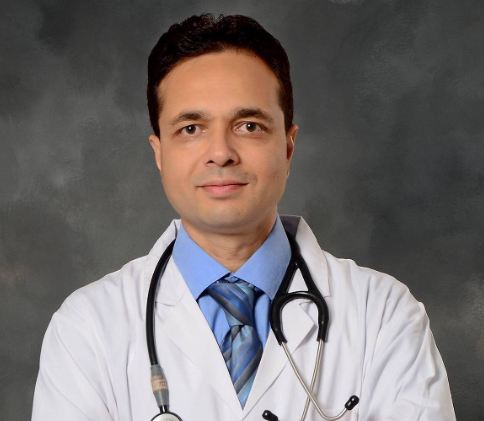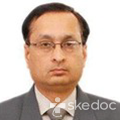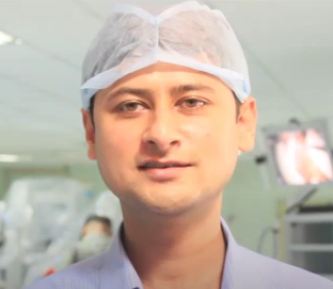Best Doctors for Varicose Veins Treatment in Indore
Varicose Veins :
Is your lifestyle putting you at risk for varicose veins? Consult with the best doctor for varicose veins treatment in Indore.
Varicose veins are enlarged, bulging, and twisted veins that are usually visible through the skin and appear dark purple or blue. They commonly occur in the legs and lower limbs due to increased pressure from standing or walking. Varicose veins develop when the valves in the veins that prevent blood from flowing backward malfunction or become weakened. This leads to poor blood circulation and the pooling of blood in the veins, resulting in the characteristic appearance. If you suspect varicose veins, consulting with the best vascular specialist in Indore is recommended.
Vascular surgeons and interventional radiologists are specialists involved in the treatment of varicose veins. These healthcare professionals diagnose and manage venous disorders, including varicose veins. Vascular surgeons are trained in surgical interventions and may perform procedures like vein ligation or stripping. Interventional radiologists utilize minimally invasive techniques, such as endovenous laser treatment (EVLT) or sclerotherapy, to address varicose veins without major surgery.
62 Doctors for Varicose Veins Treatment found
New Sajeevni Clinic
New Palasia
7, 3/2, Shreyansh Nath Apartment
Dr R S Bhandari Marg
New Palasia, Indore
Get directions

OP Timings
Mon - Sat | 11:00 am - 03:00 pm, 05:30 pm - 08:00 pm |
Fee : 300
216, Second Floor, Shekhar Central
Near Sanghi Motors
New Palasia, Indore
Get directions

OP Timings
Mon - Wed,Fri | 09:00 am - 11:00 am |
Fee : 1500
4/5
Ravindra Nagar
Old Palasia, Indore
Get directions

OP Timings
Fee : 1500
Shalby Hospital
Old Palasia
Part 5 & 6, Race Course Road
R S bhandari Marg
Old Palasia, Indore
Get directions

OP Timings
Mon - Sat | 11:00 am - 04:00 pm |
Fee : 700
Mahi Women's Clinic & Sugical Center
Radio Colony Indore
H- 3, Ahilyapuri Colony
Near Indore Residency Club
Radio Colony Indore, Indore
Get directions

OP Timings
Mon - Sat | 01:00 pm - 04:00 pm |
Fee : 500
Dr. Sanat Dalal Clinic
Usha Nagar
283, Opposite Ranjeet Hanuman
Near Footi Khothi Road
Usha Nagar, Indore
Get directions

OP Timings
Mon - Sat | 10:00 am - 02:00 pm |
Fee : 300
A.N.S Hospital
Rau
12F, 13F, Shramik Colony
A B Road, Kanupriya Nagar
Rau, Indore
Get directions

OP Timings
Fee : 500
11, Sarju Prasad Marg
Kanchanbaug Road
South Tukoganj, Indore
Get directions

OP Timings
Mon - Tue | 10:00 am - 11:30 am |
Fee : 700
Ronak Plaza, No 202
No 8/B, S Tukoganj Street 1
South Tukoganj, Indore
Get directions

OP Timings
Mon - Sat | 12:00 noon - 02:00 pm |
Fee : 700
14, Anoop Nagar
LIG Square
AB Road, Indore
Get directions

OP Timings
Fee : 600
318, Ranjeet Hanuman Road
Annapurana Road, Usha Nagar Ext
Usha Nagar, Indore
Get directions

OP Timings
Fee : 500
Door No 25-A
Bhawanipur Colony
Bhawanipur Colony, Indore
Get directions

OP Timings
Mon - Sat | 07:00 pm - 09:00 pm |
Fee : 500
Global Sng Hospital
South Tukoganj
16/1, Kanchan Bagh Main Road
Near Jain Temple
South Tukoganj, Indore
Get directions

OP Timings
Mon - Sat | 11:00 am - 12:00 noon, 04:00 pm - 06:00 pm |
Fee : 500
15/2
Near Surya Hotel
South Tukoganj, Indore
Get directions

OP Timings
Fee : 500
Plot No. 2
Scheme No.78-II
Vijay Nagar, Indore
Get directions

OP Timings
Mon - Sat | 09:00 am - 11:30 am |
Fee : 500
21-23 G F, Scheme No. 54,
Opp. Meghdoot Garden
Vijay Nagar, Indore
Get directions
304, Ankur Alley Apartment
Satya Sai Square
Vijay Nagar, Indore
Get directions

OP Timings
Mon - Sat | 12:00 noon - 02:30 pm, 06:00 pm - 08:30 pm |
Fee : 500
Anand Hospital and Research Center
Sindhu Nagar
7, Sindhi Colony
Bhawarkua Main Rd
Sindhu Nagar, Indore
Get directions

OP Timings
Mon - Sat | 10:00 am - Onwards |
Fee : 1000
Medicare Hospital & Research Centre
Old Palasia
4/5
Ravindra Nagar
Old Palasia, Indore
Get directions

OP Timings
Fee : 700
Dr. Dilip Kothari
MBBS, MS, FACRSI
Fellowship in Gastro Intestinal Surgery
Surgical Gastroenterologist
View Profile
Bombay Hospital
Vijay Nagar
IDA Scheme No.94/95
Eastern Ring Rd, Tulsi Nagar
Vijay Nagar, Indore
Get directions

OP Timings
Mon - Sat | 11:00 am - 03:00 pm |
Fee : 800
View Profile
906/1, Indore-Icchapur Rd
Tower Chouraha, Bhawar Kuan Main Rd
Khatiwala Tank, Indore
Get directions

OP Timings
Mon - Sat | 02:00 pm - 03:00 pm, 06:00 pm - 08:00 pm |
Fee : 700
5/1, Bhawarkua Main Rd
Transport Nagar
Navlakha, Indore
Get directions

OP Timings
Fee : 500
318, Ranjeet Hanuman Road
Annapurana Road, Usha Nagar Ext
Usha Nagar, Indore
Get directions

OP Timings
Fee : 700
715-716, Vijay Syndicate
Annapurna Main Road
Annapurna Nagar, Indore
Get directions

OP Timings
Mon - Sat | 06:00 pm - 08:00 pm |
Fee : 500
120 , Labriya Bheru Nagar
Opposite Kastoor Cinema
Dhar Road, Indore
Get directions

OP Timings
Fee : 1500
Varicose Veins - Treatment in Indore
Varicose veins are swollen, twisted blood vessels that appear under the skin's surface, commonly in the lower body. They result from weakened vein walls and faulty valves, causing blood to pool, and leading to visible blue or purple bulges on the legs, feet, or ankles.
Vascular surgeons and interventional radiologists are specialists involved in the treatment of varicose veins. These healthcare professionals diagnose and manage venous disorders, including varicose veins. Vascular surgeons are trained in surgical interventions and may perform procedures like vein ligation or stripping. Interventional radiologists utilize minimally invasive techniques, such as endovenous laser treatment (EVLT) or sclerotherapy, to address varicose veins without major surgery.
How is varicose vein condition is Diagnosed?
Varicose veins are diagnosed through a physical examination and may involve additional tests like ultrasound to assess blood flow. The doctor evaluates the extent of venous insufficiency to determine an appropriate treatment plan.
What are the Treatment Options for Varicose Veins?
- Sclerotherapy: This involves injecting a solution into the affected vein, causing it to scar and close. It is commonly used for smaller varicose veins and spider veins.
- Endovenous Laser Treatment (EVLT) or Radiofrequency Closure: These procedures use heat generated by laser or radiofrequency energy to close off the varicose vein. They are performed through a small catheter inserted into the vein.
- Laser Therapy: Laser energy is directed at the varicose vein, causing it to collapse and fade. This is often used for smaller veins and spider veins.
- Foam Sclerotherapy: Similar to traditional sclerotherapy, but with a foam solution. This may be used for larger veins.
- Ambulatory Phlebectomy: This involves the removal of smaller varicose veins through tiny incisions. While it is a form of surgery, it is considered minimally invasive compared to more extensive vein-stripping procedures.
- Endoscopic Vein Surgery: This procedure is used in advanced cases and involves the use of a tiny camera to close off or remove varicose veins through small incisions.
- Compression Stockings: This is not a treatment to eliminate varicose veins, compression stockings can help manage symptoms by improving blood circulation and reducing swelling.
If surgical intervention is deemed necessary for the treatment of varicose veins, the specific pre-surgery preparations, post-surgery care, and recovery time can vary depending on the type of surgical procedure performed.
Frequently asked questions
Who are Vascular Surgeons and what do they do?

Vascular surgeons are specialized medical professionals who focus on the diagnosis and treatment of conditions affecting the vascular system, including arteries and veins. They are experts in managing diseases like atherosclerosis, aneurysms, and varicose veins. Vascular surgeons employ both surgical and non-surgical interventions to address vascular issues, ranging from minimally invasive procedures like angioplasty to complex surgeries such as bypass grafting. Their goal is to restore and improve blood flow, promoting overall vascular health and preventing complications associated with vascular diseases.
What are the treatment procedures offered by doctors for varicose veins treatment in Indore?

In Indore, doctors offer various treatment procedures for varicose veins. Vascular surgeons and interventional radiologists may recommend minimally invasive options like endovenous laser treatment (EVLT) or sclerotherapy. These procedures involve closing off or removing affected veins, improving blood circulation and alleviating symptoms. Lifestyle modifications, compression stockings, and, in some cases, surgical interventions like vein ligation or stripping may also be part of the comprehensive treatment plan. The choice of procedure depends on the severity of varicose veins and the individual's overall health.
Is varicose vein treatment a painful procedure?

Varicose vein treatment procedures typically involve minimal pain. Minimally invasive techniques like endovenous laser treatment (EVLT) or sclerotherapy are designed to be relatively painless, causing only mild discomfort. These procedures are performed with local anaesthesia to ensure patient comfort.
Surgical interventions, if required, may involve a slightly longer recovery period and may cause mild postoperative discomfort. However, advancements in medical techniques and anaesthesia contribute to making varicose vein treatments generally well-tolerated with manageable levels of discomfort during and after the procedures.
What is the cost of Varicose vein treatment?

The cost of varicose vein treatment in Indore can vary based on factors such as the type of procedure, the severity of the condition, and the healthcare facility chosen. Minimally invasive treatments like endovenous laser treatment (EVLT) or sclerotherapy may have a lower cost compared to surgical interventions. On average, the cost can range from INR 20,000 to INR 1,00,000 or more. It is advisable to consult a varicose vein doctor for specific details on costs and any potential additional expenses related to consultations, diagnostics, or post-treatment care.
What are the signs and symptoms seen in Varicose Veins Condition?

Varicose veins often present with visible, swollen, and twisted veins, commonly in the legs. Symptoms may include:
- Bulging veins that are dark purple or blue
- Achy or painful legs, especially after prolonged standing or sitting
- Itching around affected veins
- Muscle cramping and a feeling of heaviness in the legs
- Swelling, usually in the lower legs and ankles
- Skin discolouration or inflammation near the affected veins
- Restlessness or throbbing sensation in the legs
What are the common diseases seen by Varicose veins specialists?

Some commonly seen diseases by the best doctor for varicose veins in Indore include:
- Varicose Veins: Enlarged, twisted veins, often visible on the legs
- Chronic Venous Insufficiency (CVI): Poor blood flow in the leg veins
- Deep Vein Thrombosis (DVT): Formation of blood clots in deep veins
- Superficial Thrombophlebitis: Inflammation of superficial veins causing blood clots
- Venous Ulcers: Chronic wounds due to inadequate venous circulation
How to prevent varicose veins?

According to the best doctor for varicose veins in Indore, the following preventive measures can help prevent varicose veins and promote vascular health:
- Engage in activities that improve circulation, such as walking, swimming, or cycling
- Maintain a healthy weight as excess weight can strain veins, increasing the risk of varicose veins
- Elevate legs when resting to reduce pressure on veins
- Avoid prolonged sitting or standing and change positions frequently to prevent blood pooling
- Use compression stockings to support blood flow
- Consume a diet rich in fibre and low in salt to maintain vascular health
- Choose comfortable footwear to promote proper circulation
Where can I find the best Varicose veins doctor in Indore?

For the best Varicose Veins doctor near you, trust Skedoc. The platform helps you to connect with highly qualified vascular specialists. It simplifies the search for experienced doctors, providing detailed information on their expertise, and patient reviews. Whether you seek minimally invasive treatments or surgical interventions, Skedoc ensures you find the right Varicose Veins specialist for personalized care and effective management of your vascular health.
Do varicose veins occur on the legs only?

No, varicose veins can occur in areas other than the legs. While they are most commonly found on the legs due to the increased pressure from standing and walking, varicose veins can also develop in other parts of the body. They may appear on the thighs, calves, feet, and even in the pelvic area. Varicose veins can also occur in the oesophagus, known as oesophagal varices, which can be a serious medical concern. While leg varicose veins are more prevalent, it's essential to be aware of potential occurrences in other regions and seek appropriate medical advice if symptoms arise.
Is varicocelectomy a permanent solution for varicose veins?

Varicocelectomy is a surgical procedure primarily performed to treat varicoceles, which are varicose veins in the scrotum. While it is an effective intervention for addressing male infertility related to varicoceles, it is not a permanent solution for varicose veins in other parts of the body.
Varicose veins in the legs, for example, may require different treatments such as endovenous laser treatment (EVLT), sclerotherapy, or other minimally invasive options. The choice of treatment depends on the location, severity, and individual health factors. Varicocelectomy specifically targets scrotal varicoceles and does not apply to all types of varicose veins.
Who can develop varicose veins?

Varicose veins can develop in individuals of various ages and backgrounds. While they are more common in older adults due to ageing and wear on vein valves, several factors contribute to their development. These include:
- Genetics and family history play a role
- Women are more prone, especially during pregnancy
- Occupations requiring prolonged standing or sitting may contribute
- Obesity, as excess weight, increases pressure on veins
- Hormonal changes like puberty, pregnancy, and menopause may trigger varicose veins
- Previous leg trauma can affect vein function
Want to know more on Varicose Veins click on Health quiz





















